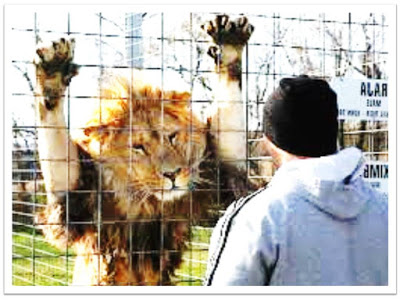This article will explore the function of emotions from an evolutionary perspective.
Imagine yourself in a zoo watching a caged lion. You’re amused as the majestic animal moves about, occasionally roaring and yawning in the bright sun. Hoping to get some kind of reaction, you roar back at the lion.
Say the lion perceives your behavior as a mockery of its communication style and charges toward you, throwing itself at the cage where you’re standing on the opposite side. Unconsciously, you run several steps backward with your heart in your mouth.
Clearly, your mind triggered the emotion of fear in you to protect you from the charging lion. Since emotions are generated by the subconscious mind, the conscious knowledge of there being a steel cage between you and the animal didn’t prevent the fear reaction from being generated.
The survival value of the emotion of fear in this context is pretty obvious. Fear keeps us alive.
Evolutionary function of emotions
Our subconscious is continuously scanning our environment for information that may potentially have some bearing on our survival and reproduction.
The right combination of information (say, a lion charging toward us) activates mechanisms in the brain that generate a specific emotion (fear, in this case).
Similarly, other emotions have other kinds of information that act as ‘switches’ to turn on emotions that motivate us to perform actions- actions that usually have the end goal of ensuring our survival and reproduction.
These emotion programs are coded into our minds by the process of natural selection. Our ancestors, who did not have any psychological mechanisms or emotion programs to feel fear when a predator chased them, got killed and didn’t survive to pass on their genes.
Therefore, it’s in our genes to feel fear when we’re chased by a predator.
Our individual past experience also determines how and when our emotion programs are activated. For example, when you roar at the lion several times, and he charges at you each time, your subconscious begins to absorb the information that the lion isn’t really dangerous.
This is why, at the 10th or 12th attempt, when the lion charges at you, you may not feel any fear. The information you received based on your past experience influenced the activation of your emotion program.

An evolutionary perspective on emotions
When looked at from the evolutionary perspective, emotions that seem perplexing can be easily grasped.
Human beings are goal-driven organisms. Most of our life goals directly or indirectly revolve around improving the chances of our survival and reproduction. Emotions are there to guide us so that we may be able to make choices that help us attain our goals.
The reason why you feel happy when you receive a salary or talk to your crush is that ‘happiness’ is an emotion program evolved to motivate you to perform actions that improve your chances of survival and reproduction.
A good salary means more resources and a better life and, if you happen to be a male, can help you attract the attention of females. If you already have kids or grandkids, more resources mean being able to invest more in those genetic copies.
On the other hand, talking to your crush tells your brain that the odds of reproducing with them in the future have improved.
The reason why you’re depressed when you go through a breakup is obvious. You just lost a mating opportunity. And if your partner was of high mate value (i.e., very attractive), you’re going to be more depressed because you lost a valuable mating opportunity.
It shouldn’t be surprising at all why people hardly get depressed when they break up with someone who’s equal in attractiveness to them or is less attractive than them.
The reason why you feel sad and unfulfilled when you’re lonely is that our ancestors lived in small communities, which helped them boost their chances of survival and reproduction.
Also, they wouldn’t have been much successful reproductively if they didn’t crave social contact and communication.
Shame and embarrassment happen to motivate you to not engage in behaviors that may lead to your ostracization from your community. Frustration tells you that your methods of attaining your goals aren’t working and that you should re-evaluate them.
Anger tells you that someone or something has caused harm to you and that you need to make things right for yourself.
Hatred motivates you to stay away from people and situations that can harm you, while love drives you toward people and situations that benefit you.
When you do something that you believe has the potential to harm you in the future, you feel guilty.
When you walk near a stenchy pile of garbage, you feel disgusted, so that you’re motivated to avoid catching a disease.
Now that you’ve reached the end of this article, how do you feel?
You probably feel good and satisfied because you gained information that increased your knowledge. People who’re knowledgeable have an advantage over those who’re not. They’re more likely to attain their life goals.
So it’s basically your mind thanking you for increasing the chances of your survival and/or reproduction.
